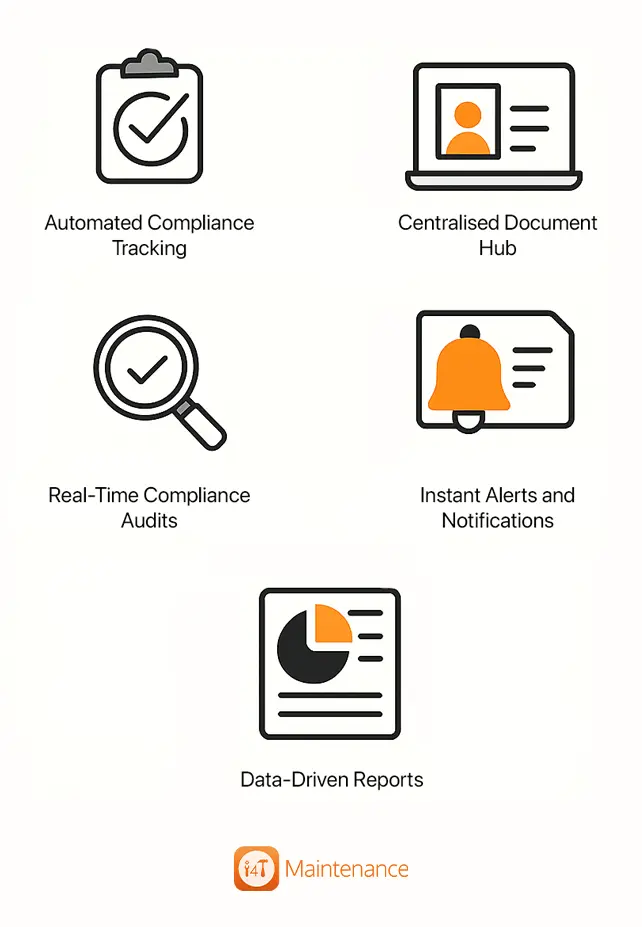Contractor compliance in strata buildings isn’t just another box to tick off, it’s a game-changer for keeping your building safe, your maintenance running smoothly, and your legal worries at bay.
The impact on your strata management goes far beyond the project at hand your reputation, your legal standing, and the safety of the building are all on the line. One slip-up could cost you more than just time; it could cost you the trust of owners and tenants alike.
In this blog, we’ll explore the crucial role contractor compliance plays in strata buildings and how it directly impacts the smooth operation of your maintenance projects
Maintenance isn’t just an expense; it’s an investment. Every dollar spent on keeping a property in good condition adds value.
The Hidden Costs of Non-Compliance
Strata management compliance is no joke. A non-compliant contractor can put you in hot water faster than you can say “building regulations”.
Legal Nightmares
Non-compliance can lead to costly legal issues. If a contractor fails to meet required standards and an incident occurs—such as an accident or failure to meet building codes you could face hefty fines and lawsuits.
Pro Tip: Always have contractors submit their compliance documents upfront to avoid legal headaches down the line.
Safety at Stake
Non-compliant contractors put resident safety at risk. Faulty work or mishandling of hazardous materials can lead to accidents or injuries.
Takeaway: Use a safety certification checklist to ensure all contractors are fully qualified and following safety protocols.
Damage to Your Reputation
A non-compliant contractor can cause a PR disaster. If things go wrong, residents and owners will look to you for answers.
Pro Tip: Regularly review contractor credentials to stay ahead of issues and maintain trust with residents and owners.
Staying on top of strata management compliance protects your buildings, your reputation, and your peace of mind.
Common Compliance Pitfalls Every Strata Manager Faces
Compliance in strata management can be a tricky maze to navigate. With multiple contractors, ever-changing regulations, and a mountain of paperwork, it’s easy for things to slip through the cracks.
Managing Multiple Contractors
Strata managers are often juggling several contractors for different building tasks each with their own set of compliance requirements. From licences to insurance and safety certifications, keeping track of everything can quickly become overwhelming.
The Maze of Regulations
Local regulations are constantly evolving, and each project may have its own set of standards. With so many moving parts, it’s easy to get confused or miss updates.
The Paperwork Jungle
Relying on hard copies of compliance documents, insurance policies, safety training, certifications can quickly turn into a paperwork nightmare. Plus, what happens when those documents expire? You could miss a renewal and find yourself in a tight spot.
Missed Inspections and Audits
It’s easy to forget about mandatory inspections or audits, but failing to schedule them can lead to serious compliance issues. Ensuring that all work is up to code before, during, and after the project is essential.
Key Compliance Areas to Track in Strata Maintenance Projects
Keeping on top of key compliance areas will not only help protect your building but also keep everything running smoothly and legally. Here are a few must-haves before assigning maintenance work to your contractors.
Licensing and Certifications
Before any contractor sets foot on-site, make sure they have the right licences and certifications for the job. Without these, your project could run into serious compliance issues.
Insurance
Contractors must have up-to-date insurance to cover accidents, damages, or injuries. Without insurance, you might be left footing the bill.
Workplace Health & Safety (WHS):
Safety is non-negotiable; it’s a legal requirement. If your contractor isn’t meeting WHS standards, the consequences could be severe.
Environmental Compliance:
Contractors must follow environmental laws, especially when it comes to waste disposal or handling hazardous materials.
Pro Tip: Staying organised with all your strata compliance-related information in one place, for accessing, tracking, and updating, is key to avoiding costly slip-ups down the line.
How Technology can Simplify Contractor Compliance Management

Managing contractor compliance doesn’t have to be complicated. With the right software, you can streamline the process, save time, and ensure your strata projects stay on track with minimal effort.
Automated Compliance Tracking
Manually tracking contractor certifications, insurance, and licences can feel like a never-ending task. The good news? With the right software, you can automate the entire process. Set up automatic reminders for when certifications or insurance are about to expire, and never miss a deadline again.
Tools like i4T Maintenance can send you proactive alerts about upcoming expirations so you can stay ahead and keep your contractors in check without the stress.
Centralised Document Hub
Gone are the days of sifting through piles of paperwork to find a contractor’s certificate or insurance document.
A digital platform like i4T Maintenance allows you to store and access all contractor documents in one central place. Everything you need is just a click away, anytime you need it.
Plus it integrates with your existing property management solutions, ensuring smooth operation without any hiccups.
Real-Time Compliance Audits
No more scrambling to check compliance levels right before an audit. With the right software, you can track contractor compliance in real-time, knowing exactly which contractors are up to code and which ones need attention.
Regularly run compliance audits within your software to stay ahead of any issues and ensure that everything is up to standard.
Instant Alerts and Notifications
Compliance deadlines can slip through the cracks if you’re not careful, but with the right software, you won’t miss a beat. Instant alerts notify you when documents are expiring, when renewals are due, or when certifications are about to expire keeping you on top of everything.
Data-Driven Reports
Tracking compliance becomes a breeze with automated, detailed reports that provide clear insights into where you stand. These reports can highlight issues with contractor performance levels or complaints raised to help you make data-driven decisions about who to hire and when to renew contracts.
5 Steps to Improve Contractor Compliance
Taking simple steps today will help you stay on top of contractor compliance and make your job as a strata manager far more efficient and stress-free.
Step 1: Build a Simple Compliance Checklist
Create a checklist for essential documents like licences, insurances, and safety certifications to verify every contractor. Make this checklist part of your standard contractor onboarding process to keep things streamlined from the start.
Step 2: Automate Where Possible
Ditch the paper files and use software that automates tracking and sends reminders for renewals and expirations. Automating the process saves you time, reduces human error, and ensures nothing slips through the cracks.
Step 3: Create a Contractor Compliance Policy
Establish a clear policy that holds contractors accountable for maintaining compliance throughout the project. This sets expectations early and helps avoid issues later on.
Step 4: Use Digital Tools for Easy Access
Switch to a digital system to store and access compliance documents at the click of a button. No more digging through filing cabinets, everything is organised and easy to find.
Step 5: Conduct Regular Audits
Schedule regular compliance audits using your software, with real-time work order tracking. Catching non-compliance issues early can prevent bigger problems down the line and keep your projects running smoothly.
Take Control of Contractor Compliance
The stakes are high when it comes to contractor compliance. Failing to stay on top of it can lead to legal, financial, and safety issues for your building and its residents. By taking proactive steps and leveraging the right technology, you can protect your building, reputation, and peace of mind.
Don’t wait for a compliance disaster to strike. Start managing contractor compliance more efficiently today. Explore how i4T Maintenance strata maintenance management software can streamline the process and provide you with the tools you need to stay compliant, every time. Book a demo today!
FAQs
Contractor compliance is crucial because it ensures that all contractors working on your strata projects are meeting legal, safety, and industry standards. This reduces the risk of accidents, legal issues, and financial penalties, while also protecting the residents and reputation of your building.
To verify a contractor’s compliance, make sure to check their trade licence, insurance certificates (like public liability and workers’ compensation), safety training records, and workplace health and safety (WHS) certifications. Depending on the work, you may also need to check other qualifications or permits.
You should review contractor compliance before the work begins, and periodically throughout the project. Regular checks ensure that contractors stay compliant with safety standards, insurance requirements, and legal regulations, and help prevent issues before they arise.
If a contractor is not meeting compliance standards, you must address the issue right away. Suspend their work until the issue is fixed, and review the potential impacts on the project, including any safety risks and legal consequences. It’s important to ensure compliance before allowing them to continue.
Absolutely! Using technology like strata management software can make managing contractor compliance much easier. These tools can automate reminders for renewals, centralise documents, track compliance levels, and conduct audits, saving you time and reducing the risk of missing important details.

